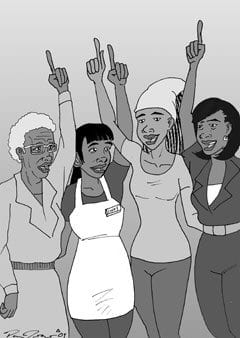
Emergence of power
For decades, African Americans have understood that a major strategy for achieving equality in this country is the development of political power. According to a report by the Pew Research Center released on April 30, blacks demonstrated their commitment to this strategy in last November’s presidential election.
Black turnout at the polls grew to almost the same level as that of whites — 65.2 percent of eligible black voters cast ballots, compared to 66.1 percent of whites. In addition, black women are to be congratulated for having a turnout of 68.8 percent of eligible voters, marking the first time that black women achieved the highest rate of any racial, ethnic or gender group.
There was also another important first in that election. The turnout rate for black voters between the ages of 18 and 29 was higher than the rate among similar groups from any other racial or ethnic group. The black youth vote increased from 49.5 percent in 2004 to 58.2 percent in 2008.
Another promising development is that the growth of the black vote in the South was substantial. Since the black population in Southern states is proportionately much higher than in the North, a higher black vote in the South will greatly influence local politics. In 2008, black turnout was 8 percent higher in Mississippi and 7.5 percent higher in Georgia, for example.
Fortunately, this greater effort by the black electorate achieved the desired result, as voters pierced the glass ceiling on who could sit in the Oval Office. This achievement should encourage black voters in future elections, and even inspire some to become involved in the political process at an early stage.
It is important to understand, however, that in politics, the battle is never over. There are so many advantages to holding the reins of political power that those who lose will never quit trying to forge a comeback.
A crack in the justice system
Under federal law, the sentence for possession of 1 ounce of crack cocaine is the same as it is for possession of 100 ounces of the powder variety. During his presidential campaign, Barack Obama pledged to eliminate the disparity. In testimony delivered last week, Lanny A. Breuer, chief of the U.S. Department of Justice’s Criminal Division, called on Congress to eliminate this injustice.
There will now be many limp rationales about why Congress has tolerated this travesty of justice for so long, but the explanation is quite simple: Past presidents have wanted to appear to be tough on crime. It is difficult to support the assertion of any rational social benefit from the disparity.
In fact, there have been numerous harmful consequences. Most of those involved with crack were black, while powder cocaine was largely a drug for whites and the affluent. The racially discriminatory treatment of those accused of crack offenses made it politically hazardous for prominent blacks in the community to become involved with the problem. It was too easy to become characterized as fronts for discriminatory prosecutors. Also, there were severe consequences for those convicted of drug felonies.
Felony convictions impaired offenders’ job prospects. They could be denied welfare benefits and access to public housing, and those who wanted to improve their lives would become ineligible for student loans.
Fortunately, the expense of incarceration has induced many state and local governments to take other approaches to treating drug addicts. Between 1999 and 2005, there was a 21.6 percent decline in the number of African Americans incarcerated for drug offenses, according to a report released last month by The Sentencing Project. That amounts to 31,000 fewer people sentenced.
It is well past the time for the federal government to change its policies.






